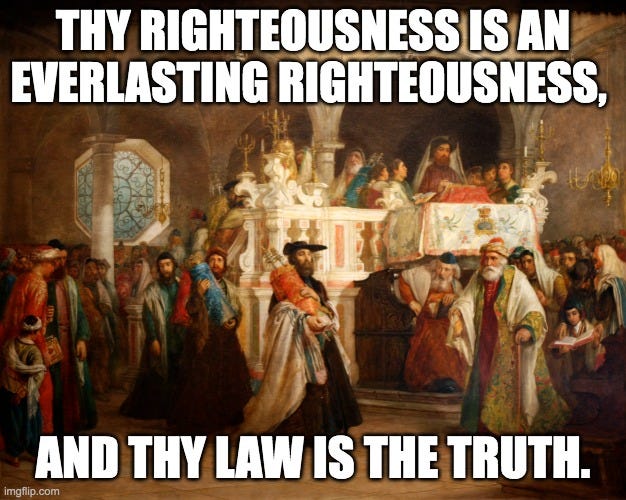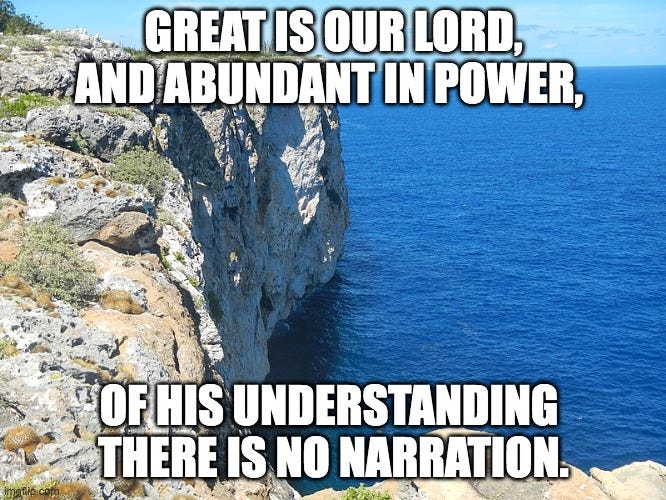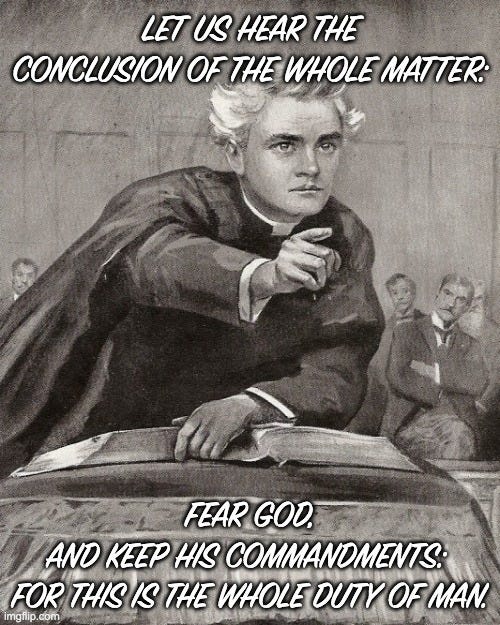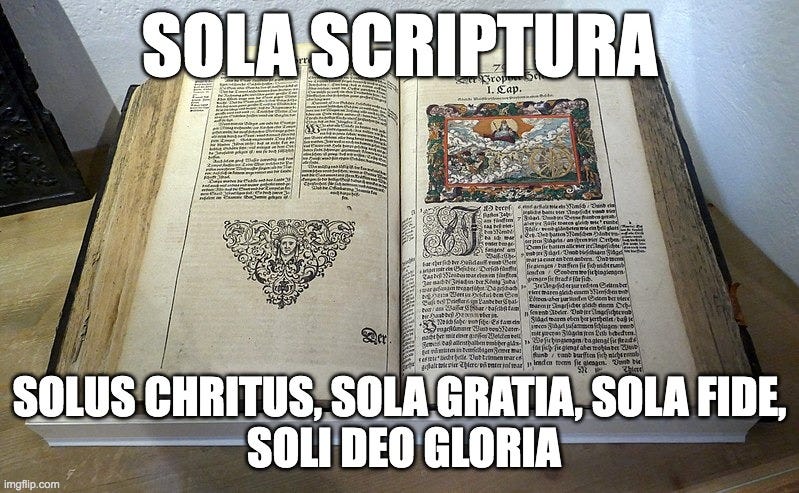Affirming Denial
The principle of Sola Scriptura lies at the heart of protestant theology. However it is a complex principle, however simple-sounding the meme that we use to express it. I tried out another meme, probably equally flawed (actually probably more so, but we persevere) of ‘alone on the top step’. The idea that the Scriptures are authoritative, but that authority comes from God, and flows down through other authorities. That is the principle taught in the Westminster Confession, London Baptist Confession, Westminster Larger Catechism, and hundreds of other protestant confessions.
Now, here is a hard thing. In order for that principle to be judged, it has to be judged on its own terms. When something is claimed as an authority, you cannot use a lower authority to judge it. The captain does not judge the actions of an admiral.
(This principle, when applied to captains and admirals, is much weaker. Because it is quite possible that the captain is wiser than, smarter than, knows the rules of the navy better than, the admiral. This cannot be the case when we are talking about the kind of authority that protestants claim for Scripture. A given pope, father, or street sweeper cannot be held to be smarter than Scripture, cannot be used to judge Scripture, without simply denying at the outset the very principle that we are attempting to discuss.)
Principles of judging
So the first issue that we have to discuss when examining the principle of Sola Scriptura is… does the judgement you bring against it come from the Scriptures themselves? Because if you bring something from outside the Scriptures to judge the Scriptures, then you have merely begged the question. You can ask ‘Is John or George the younger brother?’ But you can’t ask, “Is the younger brother the older brother?” unless you wish to propose some novel or changing definition of ‘younger’.
So when we examine Stephen Weller’s argument against Sola Scriptura, the first thing we have to ask is if he is bringing in outside authorities or examining the principle against Scripture itself. And his start is… mixed:
For any ultimate principle of authority to be true, it cannot explicitly disavow that it is the ultimate principle of authority.
Our Lord affirms this principle. Despite His unfathomable humility, He still proclaims in John 14:6 that He “is the Way, the Truth, and the Life and no one comes to the Father except through Him.” Now, if He had not said this, He still could have been the Way, Truth, and LIfe. But Our Lord could not have said “I am not the Way, Truth, and Life,” though His power be omnipotent. He could not have lied about Himself, nor can scripture. And it certainly lends credibility to His supreme authority that He in fact claims to possess it.
He starts with a statement ‘it cannot explicitly disavow’ which sounds nice on the face of it, but is not, in fact, something self-evident. We all have read stories where some authority sneaks into his own restaurant, bank, or prison… pretending to be a regular customer or prisoner, in order to see how things are going.
And Scripture seems to have several such stories. We read ‘some have entertained angels (messengers from God) unaware’. We see God’s angels staying for a clandestine visit in Sodom. We even see Christ Himself born as a baby… true, with some angelic announcements but, at least as the average Joseph on the street was concerned, perhaps not as announced as He could be. The ultimate authority, walking in the same dust as everyone else.
I am the truth
Jesus saith unto him, I am the way, the truth, and the life: no man cometh unto the Father, but by me.
John 14:6
So Stephen points us to John 14:6, in which Jesus points us to His nature as ‘the way, the truth, and the life’. Fair enough. But I must say I don’t see where this passage says what he wants it to say. The principle he is bringing forth is “For any ultimate principle of authority to be true, it cannot explicitly disavow that it is the ultimate principle of authority.”… and that is not what Christ says. He doesn’t speak of ‘ultimate principles of authority’ at all. Nor does He tell us how they are required to act.
Authority
Indeed, that seems an odd passage to choose. It seems to me that Stephen could have chosen a passage that speaks about authority. For example:
And hath given him authority to execute judgment also, because he is the Son of man.
John 5:27
Which speaks of the Son’s authority, given him by His father. Indeed it goes on to say
I can of mine own self do nothing: as I hear, I judge: and my judgment is just; because I seek not mine own will, but the will of the Father which hath sent me.
John 5:30
Which seems to say a good deal about the nature of authority. All authority belongs to God the Father, and he distributes it according to His will.
Indeed if we translate the idea of ‘put under’ as one of authority, we see the God the Father has given all authority to His Son:
For he hath put all things under his feet. But when he saith all things are put under him, it is manifest that he is excepted, which did put all things under him.
1Cor 15:27
In order that His Son may put all things, including Himself, under the Father:
And when all things shall be subdued unto him, then shall the Son also himself be subject unto him that put all things under him, that God may be all in all.
1Cor 15:28
Which authority is exercised via the empowerment of teachers:
These things speak, and exhort, and rebuke with all authority. Let no man despise thee.
Titus 2:15
And taking the word ‘power’ as meaning ‘authority’, we have the famous statement by Christ:
And Jesus came and spake unto them, saying, All power is given unto me in heaven and in earth.
Go ye therefore, and teach all nations, baptizing them in the name of the Father, and of the Son, and of the Holy Ghost:
Teaching them to observe all things whatsoever I have commanded you: and, lo, I am with you always, even unto the end of the world. Amen.
Matthew 28:18-20
Dating
God, who at sundry times and in divers manners spake in time past unto the fathers by the prophets,
Hath in these last days spoken unto us by his Son, whom he hath appointed heir of all things, by whom also he made the worlds;
Hebrews 1:1-2
One important principle, when discussing the authority of God’s Word, is that of timing. No one claims that God delivered a nicely bound copy of the King James Bible, with his name printed on the outside and a motivational dedication on the fly leaf, to Adam as he sat watching the animals in the garden. God’s first word to Adam, as far as we can tell, wasn’t even scratched out on papyrus. It was a spoken word. Spoken to one man.
Indeed it might have been hundreds or even thousands of spoken words, only a few of which have come down to us in recorded form. And then, over the years, thousands more words were spoken and, over time, more and more of them were written down and preserved. We have none of the prophecies that God gave to Saul, for example, as he lay naked among the prophets.1
And there will come a day when the written word of God will be obsolete. We will be conversing with God Himself, face to face, all day every day. We will get to take walks with Daniel, and play war games with Joshua. Race angels, zipping between the clouds.
So the doctrine of Sola Scriptura has a definite ‘date’ to it. It refers exclusively to the time between when the cannon was closed to the time when the heavens shall be open. It applies only to those who are currently on Earth, not those already setting cloud zipping records.
Audience
And, in the same vein, it has a limited audience. Abraham is excluded, Daniel is not among those covered, and Christ stands in no need of such a doctrine. Those who cannot read, or cannot yet read, are in the position of having it mediated to them.
Conclusion
Going the long way round I arrive at this conclusion: I don’t think that Stephen has made his point here.
Scripture does not actually list his point as a principle. So it would be a principle from outside being used to judge Scripture. Which is begging the question and arguing in a circle.
Many passages in Scripture have examples of authorities who are, at the very least, hidden. So the idea that all authorities must explicitly, overtly, and to everyone at all times announce their authority is not one we get from Scripture.
I, at least, don’t get how the passage he brings forth has much to do with the point he is trying to make. Great passage… just not that point. Lots of other good passages on authority to use.
However… it does not seem to matter that much. It is not a point of conclusion, but a point of basic building. He seems to wish to say that the concept of Scripture as authority will be denied if Scripture contradicts it. Fair enough.
But it will take Scripture contradicting it itself, not some outside authority claiming that Scripture contradicts it. And, as I pointed out in my first post, it will take Scripture contradicting the actual doctrine, not a straw man or a misunderstood meme. Because ‘Sola Scriptura’ is a meme, not a doctrine. It is the title of a section, not the section itself.
Thank you for reading Von’s Substack. I would love it if you commented! I love hearing from readers, especially critical comments. I would love to start more letter exchanges, so if there’s a subject you’re interested in, get writing and tag me!
Being ‘restacked’ and mentioned in ‘notes’ is very important for lesser-known stacks so… feel free! I’m semi-retired and write as a ministry (and for fun) so you don’t need to feel guilty you aren’t paying for anything, but if you enjoy my writing (even if you dramatically disagree with it), then restack, please! Or mention me in one of your own posts.
If I don’t write you back it is almost certain that I didn’t see it, so please feel free to comment and link to your post. Or if you just think I would be interested in your post!
If you get lost, check out my ‘Table of Contents’ which I try to keep up to date.
Von also writes as ‘Arthur Yeomans’. Under that name he writes children’s, YA, and adult fiction from a Christian perspective. His books are published by Wise Path Books and include the children’s/YA books:
The Bobtails meet the Preacher’s Kid
and
As well as GK Chesterton’s wonderful book, “What’s Wrong with the World”, for which ‘Arthur’ wrote most of the annotations.
Arthur also has a substack, and a website. On the substack you can listen to some of his published books. Free.
Thanks again, God Bless, Soli Deo gloria,
Von
Links
I Samuel 19:24








